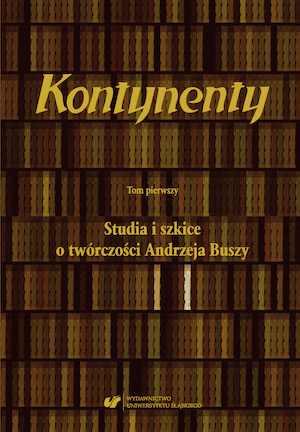Krótka autobiografia poetycka
A Short Poetic Autobiography
Author(s): Andrzej Busza
Subject(s): Polish Literature
Published by: Wydawnictwo Uniwersytetu Śląskiego
Keywords: autobiography; the Continents; emigration; Canada; Bogdan Czaykowski; Andrzej Busza;
Summary/Abstract: Andrzej Busza begins his short poetic autobiography by reflecting on his qualifications to discuss his own poetry, when two dozen professional critics have assembled to examine various aspects of his work. He confesses that while he is endowed with imagination, abstract thinking is not his forte. Sociological and cultural aspects of the “Busza phenomenon” in the context of diasporic writing and in particular in relation to the so‑called Kontynenty (“Continents”) group have already been examined quite thoroughly and expertly. There is, however, something on which he can claim to be an expert: his own poetry. Stressing his various dualities (of which he has always been keenly aware): poet and academic, a fluent speaker of two languages, a homo duplex suspended between two identities and two cultures, Busza believes that he can offer some singular insights into his “case”. He proceeds to do this, first, by relating two occasions which could be said to have signaled the awakening of a poetic sensibility; then, he describes the beginnings of his writing, followed by a crucial encounter with a slightly older, more experienced poet, Bogdan Czaykowski, who became his first mentor; he concludes the account of his poetic apprenticeship by delineating the role of Zbigniew Herbert and Tymoteusz Karpowicz in his development. The next phase involved his move from England to Canada, where he joined Czaykowski, who had come there somewhat earlier. Together they embarked on several projects, translating modern Polish poetry into English. For Busza, the process in effect entailed the composition of poetic texts in English. Subsequently, he spent a year in France immersing himself in yet another language: French. On his return from Europe, he experienced a period of virtual (poetic) silence, and then started writing poetry in English, though in essence still intended for his implied Polish reader. Eventually, he found his readership in Poland largely as “a poet in translation”. The sketch ends on a question about the viability of Busza’s poetic practice. Is it just quixotic or somehow reverberant of the cultural and linguistic confusion of our time?
Book: Kontynenty. T. 1: Studia i szkice o twórczości Andrzeja Buszy
- Page Range: 17-26
- Page Count: 10
- Publication Year: 2019
- Language: Polish
- Content File-PDF

